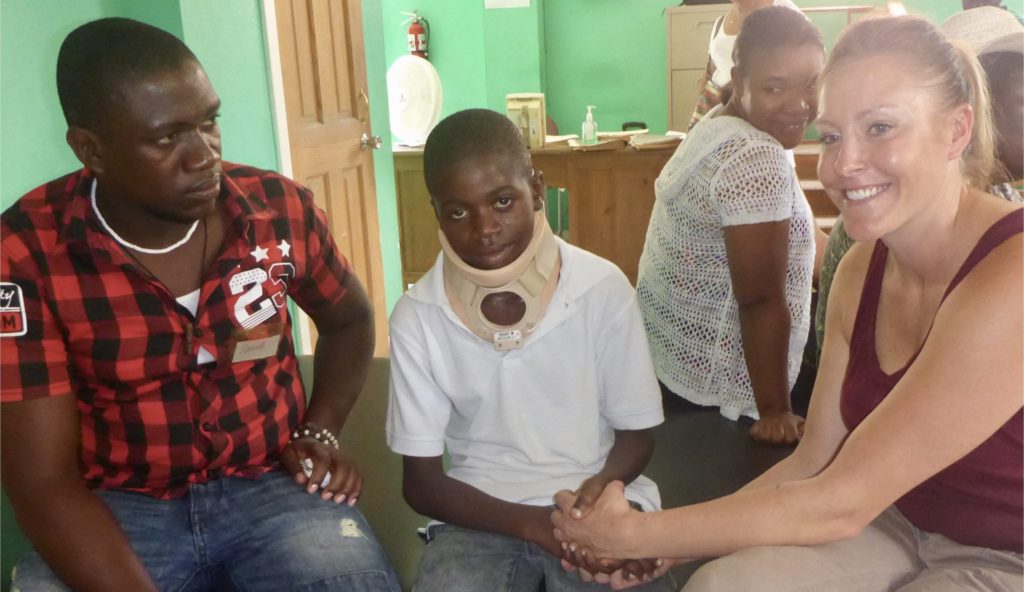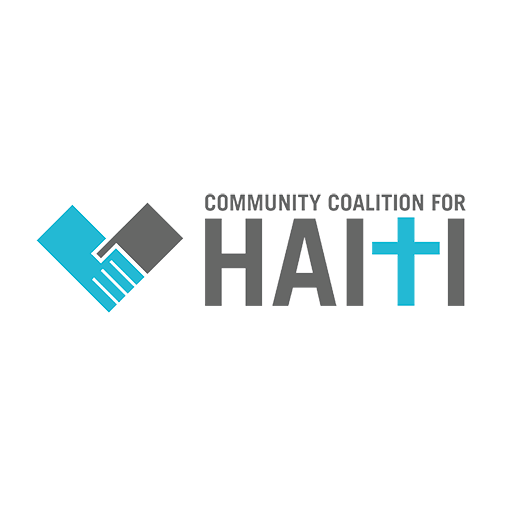 With guest bloggers Dr. Steven Wentz, PT and his sister and fellow Physical Therapist volunteer, Dr. Lauren Mathot (photo right). July 16, 2018
With guest bloggers Dr. Steven Wentz, PT and his sister and fellow Physical Therapist volunteer, Dr. Lauren Mathot (photo right). July 16, 2018
Often we see humanity’s greatest expression of love at the most dire of times, and this story is no different.
When one comes to a developing nation one expects to see devastation, pain, and hardship. One might even expect to experience heartbreak. But, can you imagine finding a collaboration of nations and individuals to save a life? In the case of one little boy, through a coalition of many people and partners his story is forever changed.

ABOVE, our team of US Physical Therapists serve along side CCH’s PT clinic staff. Left to right: Baker, Juberson, Steve Wentz, Roosevelt (translator), Lauren Mathot, and Rob Corriea.
BELOW, Lauren discusses Joseph’s case with his mother with the help of Roosevelt translating.

In early June, a U.S. medical team came to serve CCH’s busy physical therapy clinic in Jacmel. When the clinic opens in the morning there are any number of patients lined up outside the door waiting to be seen. Sometimes as many as 40 to 50 individuals are crammed into the clinic room — scarcely bigger than a mobile home. It’s understandably chaotic. Into this environment walked Joseph, a 14 year old boy and his mother. She complained that Joseph could not walk without falling and was having difficulty using his hand to write and lift his book bag.
Twelve days prior, Joseph had slipped while jumping up on a park bench and fell on his head, like stepping on a banana peel in a cartoon. He lost consciousness temporarily went limp. When he came to he could not speak and began to have seizures and weakness; it was apparent that Joseph needed medical attention. Like any mama bear would do, she transported him to the hospital (a 4 hour journey) where they were able to provide her with CT scan of her son’s head. This was at great cost to their family considering not only the expense of the travel, but also the hospital bill. She was told that the CT was clear of brain damage, and Joseph should go to physical therapy to help him learn to use his hands and walk again.
 An immediate order was written for an x-ray at the local hospital, and an adult neck brace at the CCH clinic was trimmed to fit Joseph’s small neck as snugly as possible. Joseph and his mother were educated by the clinicians about their concerns he was placed on immediate restrictions to not turn his head, avoid bumps, jerking movement and any lifting – a feat difficult for any young child to do. At worst there was a certain possibility that at any moment Joseph could experience a complete loss of function from his neck down to his toes, also known as quadriplegia.
An immediate order was written for an x-ray at the local hospital, and an adult neck brace at the CCH clinic was trimmed to fit Joseph’s small neck as snugly as possible. Joseph and his mother were educated by the clinicians about their concerns he was placed on immediate restrictions to not turn his head, avoid bumps, jerking movement and any lifting – a feat difficult for any young child to do. At worst there was a certain possibility that at any moment Joseph could experience a complete loss of function from his neck down to his toes, also known as quadriplegia.
Riding on roads through Haiti is like whitewater rafting, but they did their best to secure smooth transportation. Hours later, Joseph returned to the CCH clinic with new x-rays, the PT team’s fears were realized. The little boy had suffered a significant neck injury that was causing his spinal cord to be squeezed. His neck x-ray images resembled a pez dispenser. The situation was dire. In the US, this child would be whisked off to surgery immediately; in Haiti, this was not an option. Joseph and his mother were sent home with instructions and neck collar until CCH and clinic staff could generate a plan.
Melissa Jean-Bart, CCH Clinical Coordinator, sent out an urgent message via Facebook that night and the next morning a Canadian Neurosurgical team that had recently arrived in Port Au Prince responded. They agreed to consider Joseph’s case and concurred with the CCH Team that Joe required a life saving surgery to put his neck back in place. But now the question was raised, how do we safely transport this boy through mountainous terrain and roads that bash you around like an old wooden roller-coaster?
If you’re inspired by this story, please consider becoming a Healthcare Hero to help CCH serve more patients like Joe. Your gift of $30 or more per month helps CCH provide consistent life-saving care at our Primary Care, Surgical and Physical Therapy clinics. And your FIRST YEAR’s worth of giving will be matched for double the impact. But hurry because only the first 15 donors who sign up for recurring gifts will be matched!
Again, through the collaboration of Haitian doctors and clinicians, U.S. medical support team, Canadian doctors, and the staff of Community Coalition for Haiti, contact was made with a retired U.S. army physician who operates a medical evacuation helicopter service, Haiti Air Ambulance. He agreed to transport the boy to Port au Prince. After a nerve-wracking ride in CCH’s blue truck on a stretcher, secured by CCH staff and his mother, Joe was taken to the Jacmel airport. One helicopter ride to Port au Prince later the Canadian team began their examination and testing, with long waits for scarce imaging equipment. It was then realized that Joe had a congenital deformity in his spine that was made worse by his accident. They did not have the equipment to perform the surgery in Haiti; they proposed bring the necessary equipment when they came back in November but Josephs’ condition could not wait that long. The best that could be done for him was a well fitted hard collar that would prevent his head from moving.
 Joseph returned home with recommendations to limit all physical activity — awaiting whatever surgical option would become available. But the Coalition wasn’t done yet. After a little research and a lot of faith, Melissa and PT volunteer Lauren Mathot reached out to Shriner’s Hospital in Philadelphia. The images, evaluation from the clinic and scans were sent to the hospital and the case was accepted! Joseph and his mother (photo above with CCH’s Dr. Francois) were flown to the US on June 13th where he underwent spinal surgery the following day. Getting him to the US so quickly was a miracle in itself as the medical transport, emergency travel visas, and pro bono care was rapidly secured. After some initial post-surgery discomfort, he regained movement and sensation on both sides of his body.
Joseph returned home with recommendations to limit all physical activity — awaiting whatever surgical option would become available. But the Coalition wasn’t done yet. After a little research and a lot of faith, Melissa and PT volunteer Lauren Mathot reached out to Shriner’s Hospital in Philadelphia. The images, evaluation from the clinic and scans were sent to the hospital and the case was accepted! Joseph and his mother (photo above with CCH’s Dr. Francois) were flown to the US on June 13th where he underwent spinal surgery the following day. Getting him to the US so quickly was a miracle in itself as the medical transport, emergency travel visas, and pro bono care was rapidly secured. After some initial post-surgery discomfort, he regained movement and sensation on both sides of his body.
Today Joe is still at Shriner’s Hospital. He’s doing well and working hard at physical therapy to regain enough strength and mobility to return home to Haiti.
We use this story as an example of Community and Coalition. It is the combined efforts of several to see to the needs of the few. But, it is also important to recognize the limitations and difficulties that people go through on a daily basis in a country like Haiti. That being said, in the face of all of this despair you will find a most welcoming people. They are happy and they are appreciative of the world’s help.




